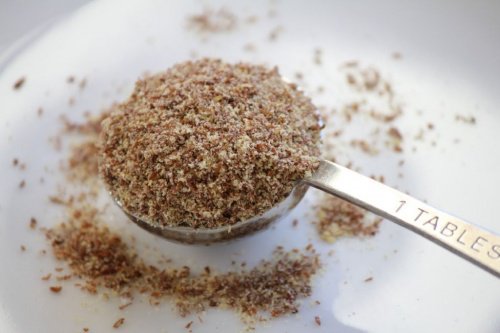10 Health Benefits of Adding Flaxseed to Your Diet


Reviewed and approved by the pedagogue in physical education and nutritionist Elisa Morales Lupayante
Flaxseed is a plant that is used in both the textile and food industries. Furthermore, on the last couple of years, flaxseed has become quite famous since it contains nutrients with a wide variety of medicinal and beauty applications.
You might like: Fiber-Packed Foods that Can Help You Lose Weight
Flaxseed is rich in omega-3 fatty acids, antioxidants, and other essential substances that function as food supplements that improve health. In fact, because of its nutritional health benefits, it has been recommended as a diet staple in many weight loss programs.
However, there are other benefits of adding flaxseed to your daily diet. In this article, we want to share 10 benefits so that you don’t miss the opportunity to try it.
1. Flaxseed helps you lose weight

The vegetable fibers in flaxseed are powerful allies when it comes to losing weight in a healthy way. These nutrients improve digestive processes and make you feel fuller so that you avoid consuming too many calories.
2. It controls cholesterol
Flaxseed’s significant soluble fiber content helps prevent cholesterol from oxidizing in the arteries, as well as also helping to naturally remove it from the arteries. This is because the fiber wraps itself around the harmful lipid and prevents it from staying trapped in the bloodstream.
3. It fights inflammatory disorders

Many experts believe that the origin of many chronic illnesses is the malfunction of the body’s inflammatory processes. These seeds contain a substance known as linolenic acid, which has anti-inflammatory properties that are very good for the body.
This is why the daily consumption of flaxseed could be the key to the prevention and treatment of:
- Gastritis
- Tendinitis
- Colitis
- Arthritis
- Osteoarthritis
4. It could help reduce the risk of cancer
27 anti-carcinogenic compounds that could be the key to cancer prevention and treatment have been found in flaxseed. Additionally, one of the most beneficial compounds, lignin, acts as a more powerful antioxidant than vitamin E.
Thanks to this, this seed helps protect against cell damage and may help reduce the presence of malignant tumors, such as those found in the breasts.
5. It facilitates hormonal balance

Many nutritionists agree that flaxseed is one of the best foods for menopausal women or for those who suffer from hormonal imbalance. This is because it contains phytoestrogens that help balance hormones naturally.
Furthermore, the consumption of this food may help increase fertility and contribute to controlling the physical symptoms that result from a decrease in estrogen levels.
6. It improves digestion
Soluble and insoluble vegetable tissue fibers are useful in treating digestive problems such as heartburn, gastritis, and constipation. Thanks to its great absorption capacity, it may help reduce gastric acid excess and prevent the formation of ulcers.
Also, flaxseed is a natural lubricant and laxative that facilitates defecation without altering the pH of the intestinal flora.
7. It boosts energy

As a result, consuming flaxseed regularly helps speed up caloric expenditure. Additionally, at the same time, it helps increase energy during a workout and other physical activities.
8. It protects cardiovascular health
Thanks to its omega-3 fatty acid and antioxidant content, flaxseed effectively helps prevent the formation of blood clots and arterial stiffness. These properties will always be effective, as long as the consumption of flaxseed is accompanied by a balanced diet and other healthy habits.
9. It prevents premature aging

Flaxseed contains vitamins that act as antioxidants, such as Vitamin B complex, folic acid, Vitamin C, and Vitamin E. These vitamins are extremely useful for reducing the premature aging process, which occurs because of the action of free radicals.
10. It reduces water retention
Thanks to its mineral and fiber content, flaxseed may improve kidney function, so that our kidneys can better filter excess water and sodium. Also, its diuretic effect shrinks the body’s tissues and stops them from retaining excess water again.
You might like: 10 Best Fruits for Fighting Against Water Retention
Finally, these 10 benefits can be enjoyed by consuming flaxseed daily, before or during every main meal.
Ultimately, the goal is to eat ground flaxseed as this makes it easier to digest. This way you can add it to salads, soups, milkshakes, and many other recipes.
All cited sources were thoroughly reviewed by our team to ensure their quality, reliability, currency, and validity. The bibliography of this article was considered reliable and of academic or scientific accuracy.
- Calado, A., Neves, P. M., Santos, T., & Ravasco, P. (2018). The effect of flaxseed in breast cancer: a literature review. Frontiers in Nutrition, 5, 4. https://www.frontiersin.org/articles/10.3389/fnut.2018.00004/full
- Draganescu, D., Ibanescu, C., Tamba, B. I., Andritoiu, C. V., Dodi, G. & Popa, M. I. (2015). Flaxseed lignan wound healing formulation: Characterization and in vivo therapeutic evaluation. International Journal of Biological Macromolecules, 72, 614-623. https://pubmed.ncbi.nlm.nih.gov/25239193/
- Hutchins, A. M., Brown, B. D., Cunnane, S. C., Domitrovich, S. G., Adams, E. R. & Bobowiec, C. E. (2013). Daily flaxseed consumption improves glycemic control in obese men and women with pre-diabetes: a randomized study. Nutrition Research, 33(5), 367-375. https://pubmed.ncbi.nlm.nih.gov/23684438/
- Ibrügger, S., Kristensen, M., Mikkelsen, M. S. & Astrup, A. (2012). Flaxseed dietary fiber supplements for suppression of appetite and food intake. Appetite, 58(2), 490-495. https://www.sciencedirect.com/science/article/abs/pii/S0195666311006969?via%3Dihub
- Kristensen, M., Jensen, M. G., Aarestrup, J., Petersen, K. E., Søndergaard, L., Mikkelsen, M. S. & Astrup, A. (2012). Flaxseed dietary fibers lower cholesterol and increase fecal fat excretion, but magnitude of effect depend on food type. Nutrition & Metabolism, 9(1), 1-8. https://nutritionandmetabolism.biomedcentral.com/articles/10.1186/1743-7075-9-8
- Kajla, P., Sharma, A. & Sood, D. R. (2015). Flaxseed—a potential functional food source. Journal of Food Science and Technology, 52(4), 1857-1871. https://www.ncbi.nlm.nih.gov/pmc/articles/PMC4375225/
- Lagkouvardos, I., Kläring, K., Heinzmann, S. S., Platz, S., Scholz, B., Engel, K. H. & Clavel, T. (2015). Gut metabolites and bacterial community networks during a pilot intervention study with flaxseeds in healthy adult men. Molecular Nutrition & Food Research, 59(8), 1614-1628. https://pubmed.ncbi.nlm.nih.gov/25988339/
- Määttänen, P., Lurz, E., Botts, S. R., Wu, R. Y., Yeung, C. W., Li, B. & Sherman, P. M. (2018). Ground flaxseed reverses protection of a reduced-fat diet against Citrobacter rodentium-induced colitis. American Journal of Physiology-Gastrointestinal and Liver Physiology, 315(5), 788-798. https://pubmed.ncbi.nlm.nih.gov/30095298/
- Mani, U. V., Mani, I., Biswas, M. & Kumar, S. N. (2011). An open-label study on the effect of flax seed powder (Linum usitatissimum) supplementation in the management of diabetes mellitus. Journal of Dietary Supplements, 8(3), 257-265. https://pubmed.ncbi.nlm.nih.gov/22432725/
- Mohammadi‐Sartang, M., Mazloom, Z., Raeisi‐Dehkordi, H., Barati‐Boldaji, R., Bellissimo, N. & Totosy de Zepetnek, J. O. (2017). The effect of flaxseed supplementation on body weight and body composition: a systematic review and meta‐analysis of 45 randomized placebo‐controlled trials. Obesity Reviews, 18(9), 1096-1107. https://onlinelibrary.wiley.com/doi/10.1111/obr.12550
- Nowak, W., & Jeziorek, M. (2023). The Role of Flaxseed in Improving Human Health. Healthcare, 11(3), 395. https://www.ncbi.nlm.nih.gov/pmc/articles/PMC9914786/
- Neukam, K., De Spirt, S., Stahl, W., Bejot, M., Maurette, J. M., Tronnier, H. & Heinrich, U. (2011). Supplementation of flaxseed oil diminishes skin sensitivity and improves skin barrier function and condition. Skin Pharmacology and Physiology, 24(2), 67-74. https://karger.com/spp/article-abstract/24/2/67/295596/Supplementation-of-Flaxseed-Oil-Diminishes-Skin
- Parikh, M., Maddaford, T. G., Austria, J. A., Aliani, M., Netticadan, T., & Pierce, G. N. (2019). Dietary flaxseed as a strategy for improving human health. Nutrients, 11(5), 1-15. https://www.mdpi.com/2072-6643/11/5/1171
- Parikh, M., Netticadan, T., & Pierce, G. N. (2018). Flaxseed: Its bioactive components and their cardiovascular benefits. American Journal of Physiology-Heart and Circulatory Physiology, 314(2). https://journals.physiology.org/doi/full/10.1152/ajpheart.00400.2017?rfr_dat=cr_pub++0pubmed&url_ver=Z39.88-2003&rfr_id=ori%3Arid%3Acrossref.org&
- Prasad, K., Khan, A. S., & Shoker, M. (2020). Flaxseed and its components in treatment of hyperlipidemia and cardiovascular disease. International Journal of Angiology, 29(04), 216-222. https://www.ncbi.nlm.nih.gov/pmc/articles/PMC7690987/
- Rodriguez-Leyva, D., Weighell, W., Edel, A. L., LaVallee, R., Dibrov, E., Pinneker, R. & Pierce, G. N. (2013). Potent antihypertensive action of dietary flaxseed in hypertensive patients. Hypertension, 62(6), 1081-1089. https://www.ahajournals.org/doi/full/10.1161/HYPERTENSIONAHA.113.02094?url_ver=Z39.88-2003&rfr_id=ori%3Arid%3Acrossref.org&rfr_dat=cr_pub%3Dpubmed&
- U.S. Department of Agriculture. (1 de abril de 2019). Seeds, flaxseed. FoodData Central. https://fdc.nal.usda.gov/fdc-app.html#/food-details/169414/nutrients
- Zarei, M., Adeli, S., Hosseini, S., & Daneshzad, E. (2022). The effect of flaxseed intake on appetite reduction: A systematic review of randomized clinical trials. Phytotherapy Research, 36(10), 3792–3804. https://pubmed.ncbi.nlm.nih.gov/35916016/
This text is provided for informational purposes only and does not replace consultation with a professional. If in doubt, consult your specialist.








